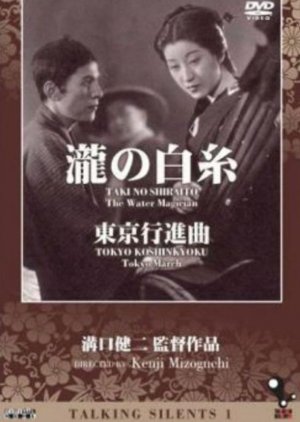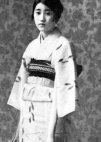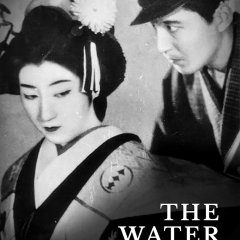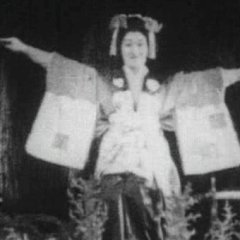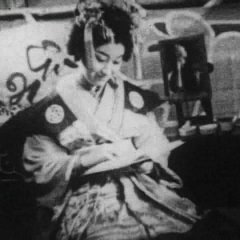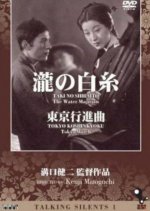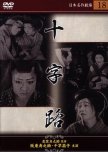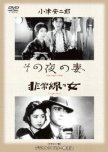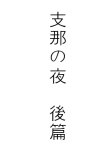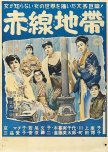- Français
- English
- magyar / magyar nyelv
- dansk
- Titre original: 滝の白糸
- Aussi connu sous le nom de: Taki no Shiraito ,
- Réalisateur: Mizoguchi Kenji
- Genres: Historique, Romance, Drame, Mélodrame
Distribution et équipes
- Okada TokihikoMurakoshi Kinaya / KinRôle principal
- Irie TakakoMizushima Tomo / Taki no ShiraitoRôle principal
- Sugai IchiroGozo Iwabuchi [Loanshark]Rôle Secondaire
- Miake BontaroShinzo [Barker]Rôle Secondaire
- Urabe KumekoGinRôle Secondaire
- Oki Etsuji Rôle Secondaire
Critiques

Cette critique peut contenir des spoilers
"It all comes down to chance"
“The river flows on, it always has, it always will.” Director Mizoguchi sent his lovers down the river to the waiting waterfall at the end in this tragic tale. He comes across as an early feminist showing his independent heroine go through many trials all at the hands of men, her every compassionate deed coming back to haunt her. Yet she never gave up or gave in even when there was little left to lose. He seemed to want to shine a light on the fact that women had little say in their lives, they could be abused, sold, and even betrayed by the male judicial system as well.Mizushima Tomo aka Taki No Shiraito performed a mesmerizing water show with a band of traveling entertainers. Known for her beauty she was also twenty-four-years old, an old maid at this time. Fate sent a carriage driver into her path. When a rickshaw passed the horse drawn carriage he drove on the road, the passengers in the carriage demanded he pass the rickshaw. In the process an axle was broken so he carried Tomo on his horse to the next town. She was instantly smitten but feared she’d never see him again. Once more fate intervened, and she found him sleeping on a bridge in the moonlight where she was walking one night. She learned his name was Murakoshi Kinaya. He’d been fired for driving the horses recklessly. His parents had died causing him to leave school in order to earn a living and now he was unemployed. Tomo told him she would help pay for him to finish law school so that he could become a great man. “As long as I breathe, I’ll remember my debt to you,” Kinaya promised.
Going into a Mizoguchi film I know better than to expect a happy ending and he did not fail that expectation. Tomo writes Kinaya letters inclosing cash for his tuition. Kinaya uses her dedication to spur on his studies and desire to succeed. During the winter, the show would have to close down and money became tight. Tomo always found a way to send Kinaya some money. Along the way, she helped two couples suffering at the hands of Minami the knife thrower and Iwabuchi the loan shark. Her generosity emptied her pockets and she had only one other means of earning the money for Kinaya to finish school and it led to the awaited tragedy. Let’s just say there is no leniency for a woman defending herself.
Kinaya and Tomo meet once again, both prepared to die. Tomo finds genuine joy in Kinaya’s success and is complete. Kinaya acknowledges he would still be a laborer if not for her sacrifices. And the water flows on, along with their short and ill-fated love.
The copy I watched of this film was very badly damaged. This was a silent film per se, but also had music and a benshi narration. I found the voiceover to be distracting and ended up muting it to focus on the performances. Even with the fading and scratches, Tomo’s water show was magnificent and a bit of a mystery as well. Irie Takako was beautiful and gave a moving performance as the compassionate woman who just wanted to be loved. Whether showing Tomo performing her water tricks, falling in love, helping those who needed it, or fighting for her life, Irie made Tomo believable and a worthy, if flawed, heroine.
Mizoguchi wasted no chance to show that it was the men in the story who created the problems for Tomo from the knife thrower to the judges. There’s an old saying, “No good deed goes unpunished,” and for Tomo this was true. Despite all she suffered for the ones she loved, she remained resolute to the end, cleansed as if from flowing water, until all that was left was joy and satisfaction.
11/21/22
Cet avis était-il utile?

